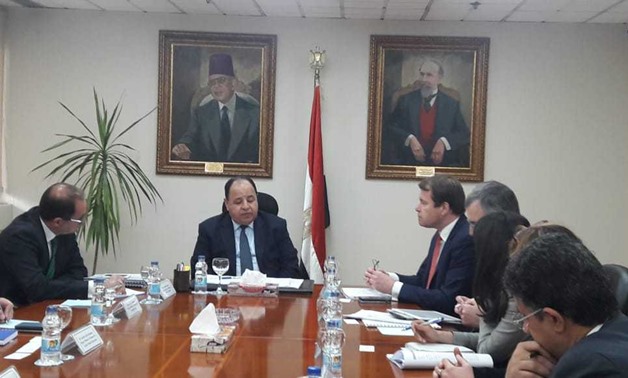
Minister of Finance Mohamed Ma’it during the meeting- Press photo
CAIRO – 7 March 2019: Minister of Finance Mohamed Ma’it announced the start of working on a new plan to manage the debt which aims at reducing public debt of gross domestic product (GDP) to 80 percent by 2022.
Ma’it stated that this step comes after the state succeeded in reducing the debt ratio of budget instruments (domestic and foreign) to domestic product to reach 97 percent of GDP in June 2018 instead of 108 percent of GDP in June 2017 and 103 percent in June 2016.
He added that the plan also aims at reducing the rate of total budget deficit to about 7 percent of GDP in the fiscal year 2019/2020, in light of the success in achieving the first surplus of LE 4 billion in 2017/2018 for the first time in 15 years, with the aim to raise it to 2 percent of GDP from 0.2 percent during last year.
The new plan also benefits from the government's success in raising the economic growth rate to 5.5 percent in the fourth quarter of last fiscal year, and aims to increase it to 5.8 percent this year, while achieving economic stability that ensures continued progress, Ma'it said.
This came during Ma’it’s meeting with Senior Vice President of the European Bank for Reconstruction and Development (EBRD) Jürgen Rigterink and his attended delegation, in presence of Deputy Minister of Finance for Financial Policies Ahmed Kojak, Assistant Minister of Finance for the Operations of Capital Markets Khaled Abdel Rahman, Assistant Minister for Economic Affairs Shereen el-Sharkawy, and representatives of the Egyptian ministry.
The minister of finance stressed that these results are the fruit of the reform program of the Egyptian economy that enabled the improvement of the economic situation despite all the challenges faced by the Egyptian government, pointing to the existence of more challenges to be faced.
In this regard, the Ministry of Finance is working in accordance with a strategic plan aimed at developing and improving the efficiency of the Egyptian tax and real estate taxes, as well as the Customs Authority, facilitating and standardizing all procedures and applying the mechanization system which will attract more investments to the local market and will encourage trade.
The minister indicated the importance of the private sector's role in participating in economic growth in order to maintain economic sustainability, referring to the preparation of a draft law on small and medium industries that will be presented soon to the Cabinet.
For his part, Rigterink congratulated the minister of Finance on the occasion of receiving the title of the best finance minister in the African continent for the year 2019, according to the magazine "The Banker”.
He also praised the ministry's serious steps towards economic reform, putting Egypt on the right track. He pointed out that EBRD has a strong relationship with the Egyptian state, as the number of private sector projects financed by the bank in 2018 ranges between 40 and 50 projects with funding of about €1.2 billion.
The senior vice president of EBRD also referred to his bank desire's to increase the volume of its investments in Egypt during the next period as it comes at the top of the bank’s coming investment plans.
"We are working on bond issuance plans such as Euro bonds, green bonds and bonds with different and longer-term segments and are going to rely on long-term segments to prolong debt life and reduce its service bill," said kojak answering the delegation's question about the current government plan.
Kojak added that the ministry is also working on increasing the base of foreign investors in Egypt, where many countries such as Japan, Singapore, South Korea and others were visited in order to attract more foreign direct and indirect investments to Egypt.
On the inflation rate, he pointed out that there is a contrast in the inflation rates as after the rates rose to about 33 percent with the rationalization and reduction of energy subsidies, they fell to about 12.7 percent.
Ma’it announced earlier that the Ministry of Finance, in partnership with all members of the Economic Group and the Central Bank, prepared an integrated strategy to reduce and manage the government debt in the medium term.
CAIRO - 3 February 2019: The Ministry of Finance, in partnership with all members of the Economic Group and the Central Bank, prepared an integrated strategy to reduce and manage the government debt in the medium term, according to Finance Minister Mohamed Ma'it.
Comments
Leave a Comment